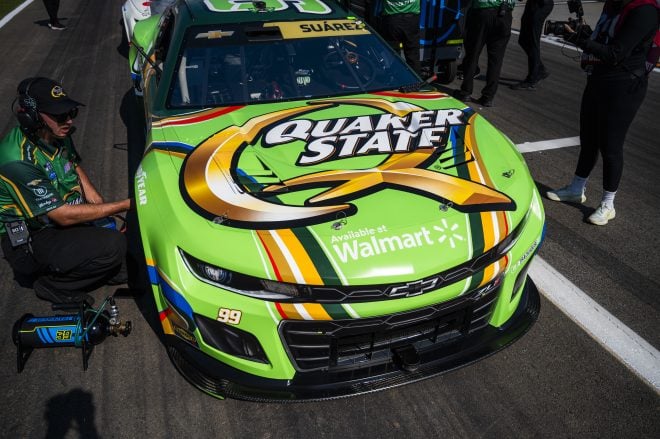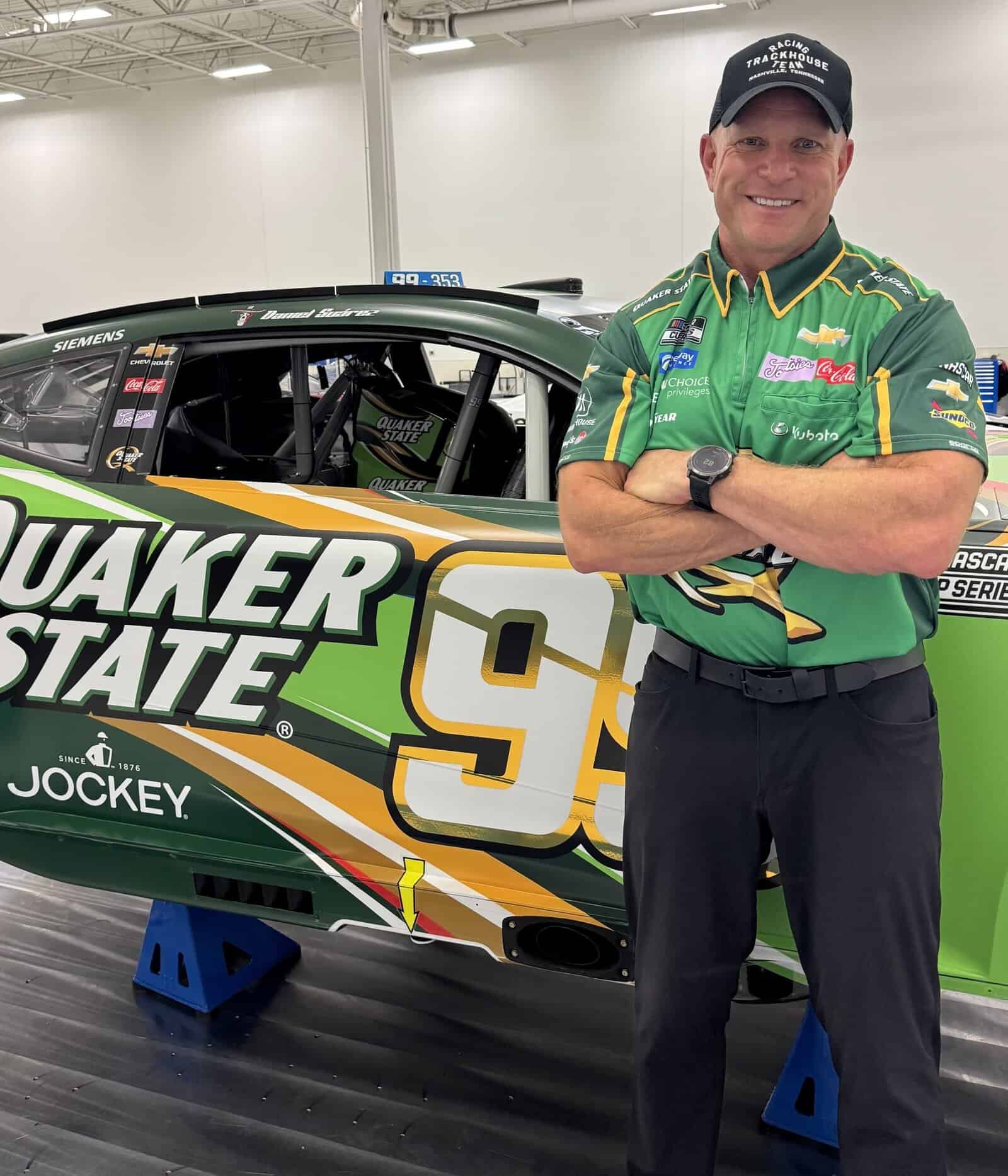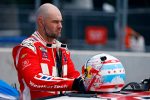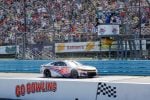On the surface, NASCAR can easily be characterized by highly competitive and often controversial racing. From driver battles in and outside the car to thrilling race finishes, NASCAR delivers entertaining races all season long. And whether it’s the addition of street and road courses on the racing calendar to expand the series’ reach to new fans or marketing to younger generations, NASCAR is embracing a more progressive approach.
But dig a little deeper and you will find there’s more than meets the eye in NASCAR, and no other team on pit road exemplifies a more modern strategy on and off track than Trackhouse Racing. At the forefront of the only five-year-old team, Trackhouse owner Justin Marks pushes the boundaries of what defines a successful NASCAR team that goes beyond race results.
At Trackhouse, they have a secret weapon that sets them apart from all the other NASCAR teams. They have Pit Crew Coach and Chief Kindness Officer, Shaun Peet, whose core beliefs center around the transformative power of failure while remaining a kind person. A former hockey player turned NASCAR pit crew coach by accident, Peet’s journey into NASCAR defies all odds and is a testament to the power of resilience and mental strength.
While his main job description is to oversee the four cars within the organization, Peet is also in charge of the culture for Trackhouse’s MotoGP team. The former hockey player’s inspiring approach to creating human brilliance in every pit crew member is universal, and he hopes to transform the sport and change it for the better.
Mandy Curi, Frontstretch: How long have you been with Trackhouse Racing?
Shaun Peet: Since its inception. I mean, they started the first year with Richard Childress in that partnership. But when Justin bought Chip Ganassi Racing, they actually called me 15 minutes before he purchased the team and said it was going to happen. And what’s so interesting, and I have so much respect for him, he used to come over to my house in North Carolina, and we would sit on the barn porch, and he would tell me about this idea he had. I was always like, ‘wow, it’s amazing if it ever comes to fruition.’ To have 12 race wins under our belt and be this thing, it’s almost surreal.
Curi: You are Trackhouse Racing’s pit crew coach and chief kindness officer. Two unique and very demanding roles.
Peet: Yeah, absolutely. You know, the pit crew, I tell people, I run the department of unrealistic expectations. Obviously, our job is to put four tires and two cans of fuel in the car in eight seconds. And then, as a motorsports enthusiast, racing is a hard business, and a lot of times we can’t even be kind to ourselves. So we just have a different ethos at Trackhouse. Our owner, Justin Marks, wants to make sure that the employee experience and how people are valued at Trackhouse is different than any other race team experience.
Curi: Let’s talk about your journey into NASCAR, because you have a unique journey. You weren’t just born and bred into racing. You came from the hockey world.
Peet: That’s correct. So my NASCAR journey was completely by accident. You know, grew up in a garage on Vancouver Island, came to the United States on a hockey scholarship, and kind of played college hockey for four years, and made my way through the minors. [I] made it to the American Hockey League, and they sent me, didn’t make the team that year, so they sent me to Greensboro, North Carolina. They put me right in the middle of NASCAR country. And opening night, I was involved in a huge brawl, and I ended up being suspended for 18 games.
And sitting up my suspension, I met a guy in the stands from NASCAR, and he said, ‘look, when your dad comes down, I’ll tour him around the race shop.’ And this is long before athletes were pitting the cars. So back at Bill Davis Racing, sure enough, my dad comes down, he takes me on a tour, practice is not going well, so the crew chiefs, like, ‘get the hockey player in here,’ and it just kind of went from there. So honestly, Mandy, it was not a fork in the road that I foresaw coming. But I’m 50 years old and feel like I haven’t worked a day in my life, so it was a blessing.
Curi: How does one make that transition from brawling on the ice to becoming a master of kindness?
Peet: Well, it’s full circle, right? And a lot of times that’s the misconception about enforcers and hockey is usually they are selfless, because I fought maybe twice out of anger my entire career. A lot of times I was fighting to stick up for teammates and stuff like that. I’ve always cared about other people and my teammates. And I think that skill set, and then the skill set with athletics just transferred into NASCAR. You know, I joke with people. I tried for 17 years to get to the National Hockey League. I made it to NASCAR in six months. With the athletic acumen of these guys and girls, that wouldn’t be the case these days.
Curi: What is your favorite part of your job?
Peet: It’s taken on a couple different iterations. When I first took it on as just the pit crew coach, I thought my favorite part of my job was going to be coming down pit road with five laps left and us beating someone on and off pit road and winning the race. And that happened a couple times at Richmond, and the guys did it. It was not as thrilling as we’re the only NASCAR team that has won our sport’s version of the Walter Payton Award, which is the Comcast community champions award. I think that is the thing that I love about my job, is you get to build men and fathers. I’ve taken immense pride in helping these guys navigate life, you know. I think as it’s evolved as Trackhouse has evolved.
Curi: Building people up on the team is important to you?
Peet: Yes, it gives you purpose, right? And to watch these guys become great fathers and just great human beings… I brag outside of work that I get to go to work with 30 of the best human beings on this planet. And I truly believe that.
I think, you know, you look at our group, we won Kansas last year on a Sunday. It was the same weekend that Hurricane Helene hit Asheville and devastated Asheville, and I just sent a text. I’m like, hey, there’s no practice Tuesday. Whoever wants to go up the mountain? We’re leaving at 5 a.m. and I called Justin Marks. I said, ‘hey, can I take $2 million worth of pit crews up the mountain?’ And the only thing Justin Marks said to me was ‘do you have room in your truck?’ And he flew in that morning, got in my truck and ran a chainsaw all day in Asheville, because two days after Helene hit Asheville, a million dollar check was not going to pull someone out from underneath their house. And that’s the guys and girls I get to go to work with. It’s easy to get up in the morning.
Curi: Trackhouse is fairly new. But how special is it to share your approach with Trackhouse?
Peet: Yeah, it’s amazing. Such a pivot from how every other race team business is run.
What he (Justin Marks) realized is, we weren’t going to out money Mr. Hendrick or Mr. Penske or Joe Gibbs, right? But what he understood was that you gravitate towards people you enjoy working with. So it didn’t matter what your resume was, is, what kind of work experience. If you walk into Trackhouse, there’s an unmistakable degree of humility that is pervasive throughout ownership, leadership, the crew chiefs, the drivers, and it’s just a different field. We’re really proud of what we have. He set a North Star on day one, and we followed it. And I give him credit for that, because that’s a dip. There were some really talented people that left our building, and that’s hard to do, but it was based on this one philosophy that’s pretty cool.
It doesn’t matter what race team you are, what business you are. It boils down to your ability to inspire human brilliance, and you do that by valuing people. And if someone thinks you make someone feel valued, you get 100% of them. And that’s kind of what we aim for at Trackhouse.
Curi: How important is it to have this positive mindset on and off track, especially during the most difficult times (for instance, if you’ve have a bad race weekend)?
Peet: Well, I mean, we have raced 38 times this year. Unless you win the race, you’re not leaving the racetrack happy, right? We have to reframe a lot of that stuff. And what is success? Winning? I don’t think that’s just winning races. It’s us getting better every day. The goal isn’t to be perfect in the end. It’s to be better tomorrow. It’s how do we keep moving people to that place?
You know, our second year in the sport, we finished second to Joey Logano in the championship at Phoenix. Okay? We didn’t want to just capture lightning in a bottle, right? But we finished 235 feet behind him. What we did, instead of just letting that go into the ethos, we painted a start line on the driveway leading into Trackhouse. We painted a finish line, and we made them 235 feet apart. We put 235 in the middle, and we painted the curves the same color as the walls at Phoenix Raceway.
So that way, when you drive into Trackhouse every single day, you drive over the distance that separated you from what a lot of people in our shop was their childhood dream. What you try to do with that is you’re trying to motivate these people, like, could you have worked a little bit harder? Could you have come up with a better idea? Could you have done something that wasn’t your job to close at 235 feet? That’s what we try to do. That’s the inspiring human brilliance part.
Curi: How do you get your crew mentally ready?
Peet: I think we do a couple things well. First and foremost, we hired a lady named Joanne Perry. She’s the mental health coach for the Carolina Panthers, and she’s brilliant. She has made such a massive difference at Trackhouse Racing and we feel very grateful to have her.
Because you think about these guys and girls are pitting racecars, and NASCAR fans are passionate, but like, if you blow a pit stop. I mean, they’re telling you of all sorts of things on social media. So we do a couple different things. First of all, we reframe a lot of things. First one is pressure. If you’re a NASCAR pit crew person, you’re going to feel pressure. But what we say all the time is, pressure is a privilege. If you’re feeling pressure, it’s because life is asking a lot of you in that moment.
And Tommy Lasorda had a great quote. He said, “The only time you feel pressure is when you start to think about failure.” You don’t think about pressure any other time. How do you reframe failure? I trained five crews all week to go pit the racecars at Watkins Glen this weekend. I know we’re going to fail, but our weekend isn’t going to be successful or not by whether we fail or not. It’s going to be successful by how we meet and move through that failure.
We ask our guys and girls to fail quickly. If the racecar comes down pit road, fail quickly on the right side, and be great when you move to the left side, or fail first stop of the race and be great the rest of the day, because we can handle that. What we can’t handle is compounding failure, and that’s the failure that shows up when you don’t allow yourself the grace to fail. Reframing some of the monsters under the bed allows these guys to play more free. And if they’re playing free, we’re a fast pit crew.
Curi: Do you have any special moments that you’ve been able to experience with any of the drivers?
Peet: I’ll catch them in a quiet moment, like I’ll catch Ross Chastain walking through the pit crew office, and no one else is there, and we’ll have a quick catch up. I was finishing up a call earlier this year, and SVG (Shane van Gisbergen) was early to the competition meeting, and I checked in with him, I asked him ‘how are you doing?’ This is before he went on his run and went and won three road course races.
First of all, he is a world class human being, and absolutely one of those humble people I’ve ever met. But you know, he was a superstar in Australia, and the way the season started off, we were fine with it, but he’s a high performer, so I just checked in with him, ‘how are you doing?’ It was interesting, because it was a week (of) the All-Star Race, and NASCAR had given him a one hour practice. He said that one hour practice with two sets of tires made all the difference in the world to him. Then he goes out, leads a lot of the Open and then just starts going on this thing. And so those moments are far and in between. But when you get to sit down with those guys, they’re just like us, right? They’re just trying to put their best foot forward and figure it out.
Curi: What do fans not know about the teamwork process and the pit crew?
Peet: One of the biggest misconceptions our fans have is that when a driver comes on pit road, that the time of the pit stop dictates everything about how they come off pit road. And nothing could be further from the truth. There are a bunch of elements that make up, when a driver pits for tires and comes out for a second, third or fourth. How does that driver get on pit road? Where do they stop? In the box, right? These boxes are marked, and if the driver puts it on the mark, we can attack the car. If the driver doesn’t put it on the mark, we have to react to the car, and that takes time.
Third thing is the adjustments the crew chief give us. If we come down pit road and we’re putting two left rounds in the left rear, there’s no way we’re beating Chase Elliott off if he’s straight up. And then it’s how the driver reacts to the drop of the jack. How fast the pit stop is and how good the driver is leaving the box and his exit speed. So you have five or six things that go into that, but oftentimes, a driver will lose three stops on pit road, and everyone’s like, ‘Oh, the pit crew is terrible.’ That is one of the narratives that I would love to see changed. It never will change, and we’re fine with that, but that’s one of the misconceptions that follows the sport.
Curi: What are your long-term goals?
Peet: My long term goal is to transform the sport. There’s the one thing that we live by at Trackhouse is we’re not here to do how it’s been done before. And you see that the way Justin’s (Marks) created the back of the haulers. So what can we do? And I honestly believe we can transform all of it. The workforce, what the racetrack experience looks like, how we value our sponsors, and how we create value for our sponsors. I think at Trackhouse, we do it a completely different way from every other team in the garage. I really believe it’s unmatched. What we try to do is create value before and then people want to partner with us because of what the experience is. I think the legacy would be to change it for the better.
Curi: Next race up is Richmond. What are you looking forward to there?
Peet: I think we’re fast there, you know, Danny (Daniel Suarez) and Ross (Chastain) both run there and again, like I said, we’re going to carry those iconic Quaker State colors on the 99 car there. We’re excited because, again, it’s every detail matters. And you know, we were running out of races to get in the playoffs. So it’s going to be a big night for Daniel, that 99 Quaker State Chevy. So we’re excited for that.





